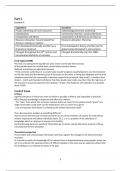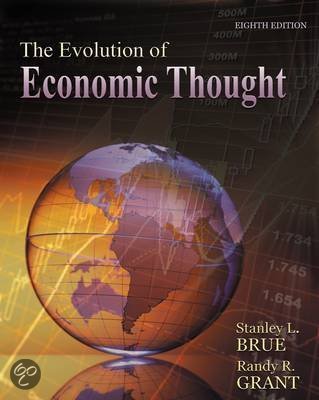Part 2
Lecture 4
Capitalism Socialism
Private ownership of most resources Collective/government ownership
Individualism Community interests, social preferences
Competition and liberty Cooperation and democracy (in theory)
Resource allocation: Decentralized free Resource allocation: Planning
decision-making on markets
First developed historically and then as a First developed in theory and then (at the
theoretical construct global scale) attempted in real societies
Changed throughout the 20th century and Changed dramatically over the 1980s
incorporated elements of socialism
Fred Taylor (1929)
The task is to compute the equilibrium price vector and to take the functions
of the market upon the socialist state, armed with economic theory.
Method: trial-and-error adjustment process.
“If the economic authorities of a socialist state would recognize equality between cost of production
on the one hand and the demand price of the buyer on the other as being the adequate and the only
adequate proof that the commodity in question ought to be produced, they could [...] perform their
duties [...] with well-founded confidence that they would never make any other than the right use of
the economic resources placed at their disposal.” (Taylor, The Guidance of Production in a Socialist
State, 1929)
Friedrich Hayek
Critique
Optimal allocation of resources under socialism is possible in theory, but impossible in practice!
Why? Because knowledge is dispersed and often also implicit:
- The "data" from which 'the economic calculus starts are never for the whole society "given" to a
single mind which could work out the implications and can never be so given
- Lots of important information is created by the market interaction itself!
Thus, the economic problem is something different:
How to secure the best use of resources known to any of the members of society, for ends whose
relative importance only these individuals know. Or, [...] it is a problem of the utilization of
knowledge which is not given to anyone in its totality.
Central planning based on statistical information by its nature cannot take direct account of these
circumstances of time and place.
Theoretical perspective
Prices collect and communicate information and thus register the changes in the interconnected
economy.
In a system in which the knowledge of the relevant facts is dispersed among many people, prices can
act to co-ordinate the separate actions of different people in the same way as subjective values help
the individual to co-ordinate the parts of his plan.
1
,Dynamic view of economy and competition
• Competitive process as an act of discovery: knowledge revealed only in the process of
competition.
• Critique of the static idea of competitive equilibrium and ‘perfect’ competition, open-endedness
Competition is [...] a process of the formation of opinion: by spreading information, it creates that
unity and coherence of the economic system which we presuppose when we think of it as one
market. It creates the views people have about what is best and cheapest, and it is because of it that
people know at least as much about possibilities and opportunities as they in fact do. It is thus a
process which involves a continuous change in the data and whose significance must therefore be
completely missed by any theory which treats these data as constant.
For Hayek, perfectly competitive model (Walras) is a nonsense. Why? Because it does not correspond
to what is actually happening during competition.
It is worth recalling that, according to Dr. Johnson, competition is "the action of attempting to
gain what another efforts to gain at the same time.“
Now, how many of the devices adopted in ordinary life to that end would still be open to a seller in
a market in which so-called “perfect competition” prevails? I believe that the answer is exactly
none. Advertising, undercutting, and improving (“differentiating”) the goods or services produced
are all excluded by definition—“perfect” competition means indeed the absence of all competitive
activities.
Theoretical and political challenges
• Equilibrium – disequilibrium – equilibration: most contemporary models still don‘t
demonstrate how agents arrive at some mutually consistent plans of action
• The role of information and communication on markets, especially in the age of Big Data
- How are prices set today?
- What information do they transmit?
• What is the role of planning in contemporary economy?
- ‚mechanism design‘ as a response to Hayek
- bigger corporations (recall Schumpeter!)
• Capitalism vs. socialism
- Inequality?
- Efficiency?
- Incentives?
- How can we compare?
Chapter 20 – Welfare economics
Ludwig von Mises
Economic calculation under socialism
Von Mises pointed out that contrary to the hopes of some socialists, markets and prices for
consumer goods were inevitable under socialism so long as these goods were privately owned. The
problem arises with capital goods, whose relative prices in a market economy reflect relative
scarcities and productive values. Prices of capital quickly change in response to changes in consumer
tastes, new technology, entrepreneurial expectations, and the like. But under socialism, where all
capital is owned by the state, no such pricing mechanism exists. Thus, the planner cannot accurately
evaluate the relative scarcities and productive values of capital.
No independent owners of the production factors → no factor markets → no prices!
No single man can ever master all the possibilities of production, innumerable as they are, as to be in
a position to make straightway evident judgments of value without the aid of some system of
2
, computation. There would be no means of determining what was rational, and hence it is obvious
that production could never be directed by economic considerations [...] How will [the
administration] be able to decide whether this or that method of production is the more profitable?
Where there is no free market, there is no pricing mechanism; without a pricing mechanism, there is
no economic calculation
Entrepreneurship is a central aspect in achieving dynamic economic welfare. Entrepreneurs attempt
to anticipate the future; those who have greater anticipatory ability tend to reap rewards in the form
of large profits, and their past successes enable them to command more resources for further
anticipatory actions.
Profits and losses perform two important functions that cannot be duplicated under socialism: (1)
they select out those who can best fulfill wants, and (2) they provide the incentive for entrepreneurs
to avoid careless, audacious, and unreasonably optimistic decisions. Competition among
entrepreneurs ensures that the benefits from their actions are widely shared by consumers, workers,
and those who own the factors of production. “The capitalist system is not a managerial system; it is
an entrepreneurial system.”
Oscar Lange
Economic theory of socialism
Market socialism is characterized by:
1. Private ownership of consumer goods and free choice of consumption from available goods.
2. Free choice of occupation.
3. State ownership of the means of production.
There are markets and market prices for goods, services, and labor, but not for capital and
intermediate goods. But a price can take a form other than a market one; it also can be a shadow
price or an index of the terms of exchange between two items. A central planning board, through a
process of trial and error, can set the prices of capital goods by adjusting these prices to eliminate
shortages and surpluses. This board pays all workers their market wage plus a share of the social
dividend determined by the total yield of capital goods and natural resources. Through this control
over shares of the social dividend, the central planning board can reduce the wide disparity of
income that is characteristic of capitalistic economies.
The central planning board instructs the managers of state enterprises to act as if all prices are
constant and to follow two rules.
1. To combine resources in the plant so that the average cost of production for any given level of
output is at a minimum. Managers accomplish this by ensuring that the marginal technical rates
of substitution between resources are equal (recall the previous discussion of Pareto optimality).
2. Determines the scale of output by stating that output has to be fixed so that marginal cost is
equal to the price of the product. This rule performs the function which under competition is
carried out by free entry of firms into an industry or their exodus from it, i.e. it determines the
output of the industry.
As long as accounting is done as if prices are constant, that is, as if they are independent of the
decisions taken, adherence to these rules will mean that prices that are set incorrectly from an
equilibrium standpoint will create either shortages or surpluses of the commodities involved.
Through trial and error the planners can adjust the prices to equilibrium levels. The trial and error
procedure is much the same as that which occurs under capitalism, but it can work better under
socialism because central planners have access to a greater range of information about shortages
and surpluses than do individual capitalists.
3






